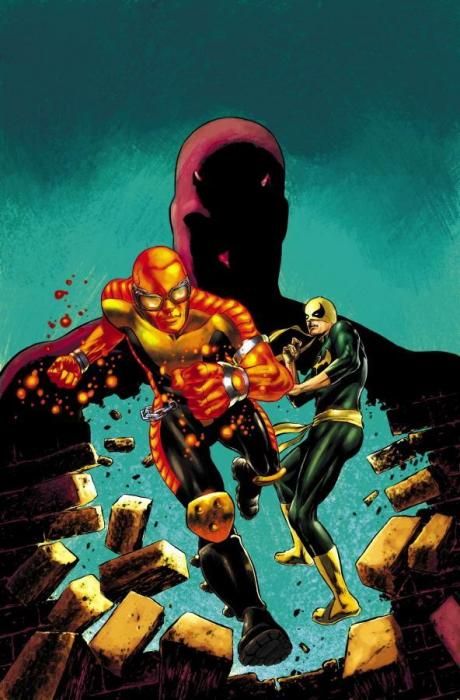Luke Cage has been going by simple "Luke Cage" for so long now that there's a gap in the market for his former superhero name, Power Man. So, the twin forces of copyright-renewal and creativity combine to bring about this, the dawn of a new "Power Man" series by Fred Van Lente and Mahmud Asrar.
The story is set slightly before the "intervention" in Shadowland #2, and sees Daredevil's ninja troops out "expanding their sphere of influence" and stumbling into a fight with the new Power Man and Cotton Mouth. Quickly, word reaches Iron Fist and Luke Cage, and the pair set out for a word with the new masked man who appears to be stepping on their toes.
There's more to connect the new Power Man to the original than a simple re-use of the name, however. Coming from Harlem, the new Power Man demonstrates immediately the same ethos Luke Cage used to espouse, concentrating on keeping his own back yard clean by fighting criminals who stray into his area. Oh, and like the original Hero for Hire, he also charges for his services where possible, though the story quickly establishes why he needs to, removing any possible moral ambiguity.
The end of the issue also leaves a few mysteries hanging. How did Power Man get his powers? Where did he learn Danny's form of Kung Fu? And why does he seem to think that Luke Cage killed his father? The result is a character who feels like a part of the Marvel Universe from the outset, although his personality strays a little too close to "New Warriors" territory for my liking, with the kind of two-dimensional "arrogant youth" persona that all teen heroes seem to embody. At this point, Power Man seems to lack the classic Marvel "flaw" in his formula. He seems a little too capable, and a little too certain of himself to be truly relatable. There is time for that to change, though.
Although Asrar has shown himself to be a capable artist in the past, there are elements of this issue which seem rushed and sketchy. It might be the effect of a new inker, or the effect of slightly over-rendered coloring, but I've seen better from Asrar's work. By no means is it poor, but there are imperfections on almost every page which chip away at the overall standard of the work, and could easily become a problem if compounded over time.
It's almost a shame that this book is tied so directly to Shadowland, because it simply reinforces the notion that it's another spin-off, rather than a stand-alone story introducing a new hero. One must assume that Marvel know best how to promote their books, but had I not chosen to review it, there's no chance I'd have picked up this book and given it a chance at all, purely because I wouldn't normally buy spin-offs. I could, of course, be in a minority, but the constant talk of crossover fatigue makes me question whether that's truly the case. Like "Daughters of the Shadow", this is a strong book, and one that makes me care enough to come back -- and that's a rare thing for one, let alone two crossover spin-offs to do.

